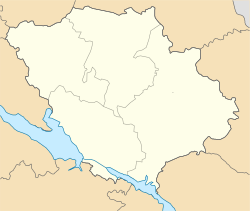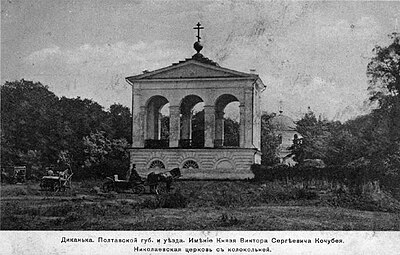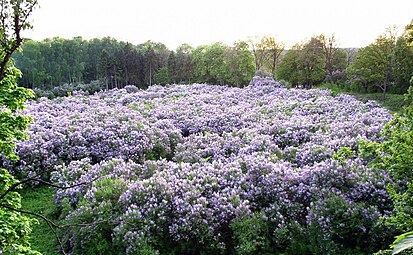Dykanka
Dykanka
Диканька | |
|---|---|
 Landscape with Holy Trinity Church | |
| Coordinates: 49°49′14″N 34°31′47″E / 49.82056°N 34.52972°E | |
| Country | |
| Oblast | |
| Raion | Dykanskyi Raion |
| Founded | 1658 |
| Area | |
• Total | 11.74 km2 (4.53 sq mi) |
| Elevation | 72 m (236 ft) |
| Population (2015) | |
• Total | 7,788 |
| Time zone | UTC+2 (EET) |
| • Summer (DST) | UTC+3 (EEST) |
| Postal code | 38502[1] |
| Area code | 5351 |
| Licence plate [2] | BI |
Dykanka (Template:Lang-uk) is an urban-type settlement and the administrative center of Dykanka Raion (district), Poltava Oblast (province) of central Ukraine. Population: 7,788 (2015 est.)[3]
The settlement is located 26 km (16 mi) away from Poltava Kyivska railway station.
History
Ancient History
Dykanka was first mentioned in 1658 as a small village, though the area was populated for centuries before. Within the area of modern Dykanka, traces exist of Scythian settlement at various times. Also found were the remains of a settlement that had at one point been razed[citation needed] and the remains of two settlements from the 7th-6th centuries BC.
Medieval History
In 1430, the Dykanka area came under the ownership of Tatar Murza Leksada Mansurksanovych, the future Prince Alexander Glinski, and, according to Leo Padalka and other pre-revolutionary (before 1917) historians, Dykanka was among his ″settlements″.
Modern History
Dykanka has held the status of urban-type settlement since 1957.
Culture
Dykanka is the location of the short story collection Evenings on a Farm Near Dikanka by Nikolai Gogol.[4] The tale of St John's Eve, concerning the family of the Church Sexton, inspired Mussorgsky's tone poem Night on the Bare Mountain.
Gallery
-
The facade of the palace of the estate Kochubeys in Dykanka. The architect Giacomo Quarenghi. Picture the end of 19th century
-
Triumphal Arch. The architect - the academician of architecture Luigi Rusca, 1820
-
Church of the Holy Trinity, 1780. Late Baroque. The architect of N. A. Lvov (?)
-
Church of St. Nicholas in the urban settlement Dykanka. The architect of N. A. Lvov, 1797
-
The bell tower of St. Nicholas Church. Architect Luigi Rusca, 1810–1827. Postcard late 19th century
-
Lilac Grove in Dykanka. The former estate of Prince Kochubey. Laid down in the early 19th century
-
Picture gallery of Marie Bashkirtseff
References
- ^ Ukrainian Zip Codes
- ^ Как расшифровываются новые номера
- ^ "Чисельність наявного населення України (Actual population of Ukraine)" (PDF) (in Ukrainian). State Statistics Service of Ukraine. Retrieved 1 July 2016.
- ^ "The Ukrainian Mystery Of Nikolai Gogol". ValueWalk. January 6, 2017. Retrieved January 6, 2017.
External links
- "Dikanka" (news of Dikanka, events, weather, all in English and Russian language)











